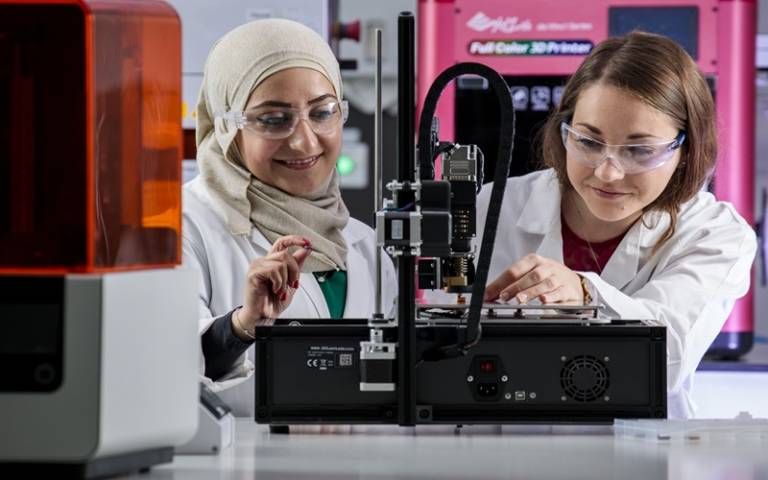Our Research Department works to develop the medicines of the future. It currently includes 19 academic staff, ten members of technical staff, and two professional services colleagues.
We also have a large body of research fellows and assistants (usually around 20) working with us, and are joined by a significant number of visitors from our global network of academic, industrial, and clinical collaborators.

We house the largest cohort of PhD students in the School and have recently been successful in securing funding for three Centres for Doctoral Training (CDTs) with the University of Nottingham. The most recent CDT, in Transformative Pharmaceutical Technologies, also involves the Science Foundation Ireland Research Centre for Pharmaceuticals, and attracted total funding of nearly £20m. This guarantees 75 PhD studentships over the next 8 years (30 at UCL) and comprises the largest research centre in the UK.
Pharmaceutics staff contribute to MPharm teaching in all years, through the formulation science modules, the research projects and the options. The department also hosts two successful MSc programmes, in Pharmaceutics and Pharmaceutical Formulation & Entrepreneurship, which together recruit around 100 students per year.
Our research is focused on taking an active pharmaceutical ingredient (drug, or API) and turning it into a useful medicine. We work with APIs ranging from traditional small molecule drugs through peptides and proteins to cells, seeking to target delivery to desired sites in the body, control release rates, and protect the structural integrity of the API. We work closely with clinical and industrial partners to deliver impact from our work and accelerate translation to the clinic. Read more about some of the themes we cover below.
Advanced pharmaceutical manufacturing
This theme links closely with our work in Formulation Sciences and Drug delivery through biological interfaces. Active drug substances ranging from low molecular weight actives such as cytotoxic agents to proteins and even cells are being modified to improve efficacy in malignant tissue as well as the brain, eye and skin. Modifications include conjugation of the active substance to biocompatible dendrimers and polymers. Particulate associated formulations (e.g. nano- and microparticles), molecularly ordered materials and tissue implantable formulations are also being developed to optimise drug action. We apply a range of advanced manufacturing approaches (3D printing, nanofabrication, electrospinning etc) to generate advanced drug delivery systems, building on our knowledge of formulation sciences and biological interfaces and applying state-of-the-art materials characterisation techniques to these.
Drug delivery though biological interfaces
Here we investigate the barriers to efficient drug delivery with the aim of engineering novel systems to overcome them. We employ a range of biological and biotechnological approaches to identify and target new transport routes for small molecule, gene and protein delivery into and across tissues including the lung, gut and the skin. The experimental systems routinely used in our research span cellular and sub-cellular in vitro models to in vivo systems to assess drug disposition at both the absorption barrier and the target cell/tissue.
Pharmaceutical formulation development
Formulation – the process of converting an active ingredient into a product that can be administered to people and/or animal models – is critical for the investigation, and ultimately the success, of drug and vaccine candidates. The research interests of the Department lie in the development of cutting-edge formulations to enable delivery of the next generation of medicines (with a focus on personalised medicines and biopharmaceuticals). We seek to develop improved systems for local and systemic activity, and to improve safety, efficacy and patient-acceptability. Formulations are developed for all the main routes of administration (including oral, nail, pulmonary, parenteral and transdermal) and a number of proprietary drug delivery platforms have been progressed to the point of commercially availability (such as PhloralTM and DuocoatTM). There are particular interests in the challenges of developing medicines for paediatric and geriatric patients.
Pharmaceutical materials analysis
Quantifying and understanding the physical form of an active ingredient is of crucial importance to medicines development. In the Research Department of Pharmaceutics, we apply a broad range of cutting edge technologies (e.g. diffraction, thermal methods, vibrational spectroscopy, in process analytics) to provide this understanding. We have a particular interest in hyphenation, where multiple techniques are applied simultaneously t the same sample.
 Close
Close

